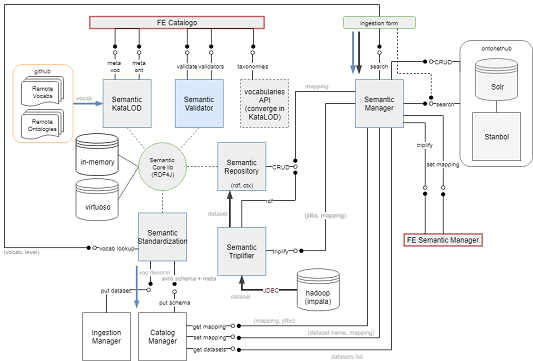The Semantic Validator is a component (based on RDF4J) designed to provide a simple way for validating RDF metadata dataset against a specific Ontology on an underlying triplestore.
The triplestore used is in-memory, rules actually are sparql queries executed in distinct repositories for the sigle validation request, in order to isolate the validations.
-
entrypoint for the play application (swagger-ui) http://localhost:9000
-
swagger definition http://localhost:9000/spec/semantic_validator.yaml
The validator is currently based on a set of queries (about 150 for DCAT-AP_IT) returning a record of information for the rules broken by the dataset, the most important infos are:
- Class name: the class involved in the rule (ex: Organization for DCAT-AP_IT)
- Rule ID: the broken rule id (ex: 207 for DCAT-AP_IT)
- Error description: the problem description (ex: "vcard:hasURL should be a resource" for DCAT-AP_IT)
there are two endpoints:
/validate: in order to validate a document/validators: in oder to ghe the list of available validators
- compile / package
$ sbt clean package- run
$ sbt runThe validator is now configured with three vocabularies:
- DCAT-AP_IT : rules set derived from the original SEMICeu/dcat-ap_validator and modified in order to be compliant with the AP_IT profile constraints
- DCAT-AP : the original rules set SEMICeu/dcat-ap_validator
- CPSV-AP : the original rules set catalogue-of-services-isa/cpsv-ap_validator
The directory stucture is modular in order to add new validators, rules and methods of validation.
The validators have to be configured in the validator.conf file under the conf directory
Semantic_Validator
│ README.md
│ build.sbt
│ ...
│
└-conf
│ application.conf
│ validator.conf
│ ...
└-dist
└-──data
└-──ontologies
└-──agid
└-──DCAT-AP_IT
│ DCAT-AP_IT.owl
│ Licenze.ttl
│ vcard-ns.ttl
│ ...
└-─validators
└-─sparql
rule-0.rq
rule-1.rq
rule-2.rq
...
OWL and ttl files in the specific ontology directory (ex: dist/data/ontologies/agid/DCAT-AP_IT) and the dataset sended to the service, are loaded together into the repository (in-memory) in order to use RDFS inference during the validation.
The most simple way to test the application locally, is running it directly from sbt
$ sbt clean compile
$ sbt runAnother option is to prepare the distribution to deploy with sbt, then run it. For example we could:
$ sbt clean dist
$ unzip -o -d target/universal/ target/universal/semantic_validator-1.0.1.zip
$ cd target/universal/semantic_validator-1.0.1
$ bin/semantic_validator -Dconfig.file=./conf/production.confPreparing a docker image is strightforward as:
$ sbt docker:stage
$ sudo docker build target/docker/stage/
$ sudo docker run -p 9000:9000 {image_id}And finally we can build and publish locally the docker image to run, by:
$ sbt clean compile
$ sudo sbt docker:publishLocal
$ sudo docker run -p 9000:9000 {image_id}- add an implementation for shacl validations
- add a CPSV-AP_IT rules set for the validator
- ...
SEE ALSO: teamdigitale/daf
[README last updated: 2018-05-22]
